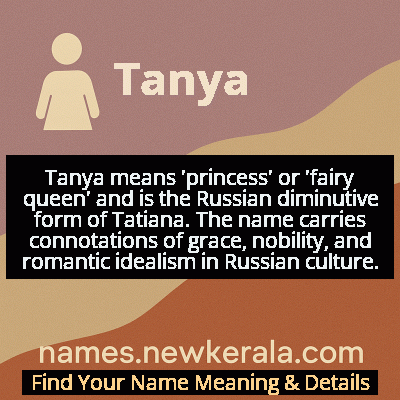Tanya Name Meaning & Details
Origin, Popularity, Numerology Analysis & Name Meaning of Tanya
Discover the origin, meaning, and cultural significance of the name TANYA. Delve into its historical roots and explore the lasting impact it has had on communities and traditions.
Name
Tanya
Gender
Female
Origin
Russian
Lucky Number
7
Meaning of the Name - Tanya
Tanya means 'princess' or 'fairy queen' and is the Russian diminutive form of Tatiana. The name carries connotations of grace, nobility, and romantic idealism in Russian culture.
Tanya - Complete Numerology Analysis
Your Numerology Number
Based on Pythagorean Numerology System
Ruling Planet
Neptune (Ketu)
Positive Nature
Intuitive, analytical, spiritual, and inquisitive.
Negative Traits
Secretive, reserved, aloof, and can be overly critical.
Lucky Colours
Green, yellow.
Lucky Days
Monday.
Lucky Stones
Cat’s eye, moonstone.
Harmony Numbers
1, 5, 6.
Best Suited Professions
Scientists, researchers, spiritual leaders, detectives.
What People Like About You
Depth of knowledge, analytical skills, spirituality.
Famous People Named Tanya
Tanya Tucker
Country Music Singer
Grammy-winning country music icon who achieved fame as a teenager with 'Delta Dawn'
Tanya Roberts
Actress
Known for roles in 'Charlie's Angels', 'A View to a Kill', and 'That '70s Show'
Tanya Donelly
Musician
Alternative rock musician and founding member of Throwing Muses and The Breeders
Tanya Chutkan
Federal Judge
U.S. District Judge known for presiding over significant January 6th cases
Name Variations & International Equivalents
Click on blue names to explore their detailed meanings. Gray names with will be available soon.
Cultural & Historical Significance
The name Tanya carries significant weight in Russian literary and cultural history. Beyond Pushkin's influence, the name appears in various Russian works as representing the ideal Russian woman - deeply emotional, morally upright, and connected to her cultural roots. The celebration of Tatiana's Day on January 25th became an important student holiday in Russia, further cementing the name's cultural significance. In the 20th century, the name spread internationally through immigration and cultural exchange, becoming one of the most recognizable Russian names worldwide while maintaining its distinctive Slavic character.
Extended Personality Analysis
Women named Tanya are often perceived as strong-willed, independent, and emotionally deep individuals. They typically combine practical intelligence with romantic sensibilities, creating a unique blend of realism and idealism. Many Tanyas exhibit natural leadership qualities and determination, often pursuing their goals with quiet persistence rather than overt aggression. They tend to be loyal friends and partners who value deep, meaningful connections over superficial relationships. At the same time, Tanyas often possess artistic or creative inclinations and appreciate beauty in various forms, from nature to human expression.
Their strength is typically tempered with compassion, making them both resilient and empathetic individuals who can navigate life's challenges with grace and wisdom. Tanyas are often seen as reliable and trustworthy, with a strong sense of personal integrity. They may appear reserved initially but reveal warmth and humor to those they trust. Many display adaptability and resourcefulness, able to handle diverse situations with competence. The combination of inner strength and emotional depth makes Tanyas particularly effective in caregiving roles, creative professions, or leadership positions where both compassion and determination are valuable.
Modern Usage & Popularity
Tanya remains a popular name in Russian-speaking countries and has established a significant presence in English-speaking nations since the mid-20th century. While its peak popularity in the United States occurred during the 1970s, it continues to be used regularly, though less frequently than in previous decades. The name maintains strong cultural connections to Russian heritage while being easily adaptable across different languages and cultures. In recent years, there's been a slight resurgence of interest in traditional Russian names, which may contribute to Tanya's enduring appeal. The name strikes a balance between being familiar enough for easy recognition while retaining its distinctive ethnic charm, making it accessible to diverse communities while preserving its cultural identity.
Symbolic & Spiritual Meanings
Symbolically, Tanya represents the fusion of strength and sensitivity, embodying the concept of 'quiet power.' The name carries connotations of royal grace without arrogance, suggesting someone who commands respect through inner qualities rather than external authority. It symbolizes the ability to maintain cultural roots while adapting to changing circumstances, much like the name itself transitioned from Russian aristocracy to global usage. Tanya also represents romantic idealism tempered by practical wisdom - the capacity to dream beautifully while navigating reality effectively. The name evokes images of winter resilience and spring renewal, reflecting its Russian origins in a climate of extremes and its association with Saint Tatiana's January feast day, suggesting someone who brings light and warmth during challenging times.

